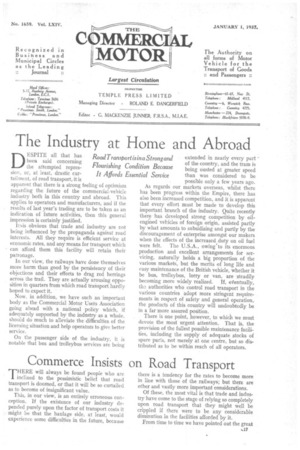The Industry at Home and Abroad
Page 67

If you've noticed an error in this article please click here to report it so we can fix it.
DESPITE all that has beeia said concerning the attempted repression, or, at least, drastic curtailment, of road transport, it is apparent that there is a strong feeling of optimism regarding the future of the commercial-vehicle industry both in this country and abroad. This applies to operators and manufacturers, and if the results of last year's trading are to be taken as an indication of future activities, then this general impression is certainly justified.
Ituis obvious that trade and industry are not being influenced by the propaganda against road interests. All they require is efficient service at economic rates, and any means for transport which can afford them this facility will retain their patronage.
In our view, the railways have done themselves more harm than good by the persistency of their objections and their efforts to drag red herrings across the trail. They are actually arousing opposition in quarters from which road transport hardly hoped to expect it.
Now, in addition, we have such an important body as the Commercial Motor "Useis Association going ahead with a national policy which, if adequately supported by the industry as a whole, should do much to alleviate the difficulties of the licensing situation and help operators to give better service.
On the passenger side of the industry, it is notable that bus and trolleybus services are being extended in nearly every part of the country, and the tram is being ousted at greater speed than was considered to be possible only a few years ago.
As regards our markets overseas, whilst there has been progress within the Empire, there has also been increased competition, and it is apparent that every effort must be made to develop this important branch of the industry. Quite recently there has developed strong competition by oilengined vehicles of foreign origin, assisted partly by what amounts to subsidizing and partly by the discouragement of enterprise amongst our makers when the effects of the increased duty on oil fuel were felt. The U.S.A., owing' to its enormous production and excellent arrangements for servicing, naturally holds a big proportion of the various markets, but the merits of long life and easy maintenance of the British vehicle, whether it be bus, trolleybus, lorry or van, are steadily becoming more widely realized. If, eventually, th3 authorities who control road transport in the various countries adopt more stringent requirements in respect of safety and general operation, the products of this country will undoubtedly be in a far more assured position.
There is one point, however, to which we must devote the most urgent attention. That is, the provision of the fullest possible maintenance facilities, including the supply of adequate stocks of spare parts, not merely at one centre, but so distributed as to be within reach of all operators.




























































































































































